Pacific Security Snapshot | 16 March 2023
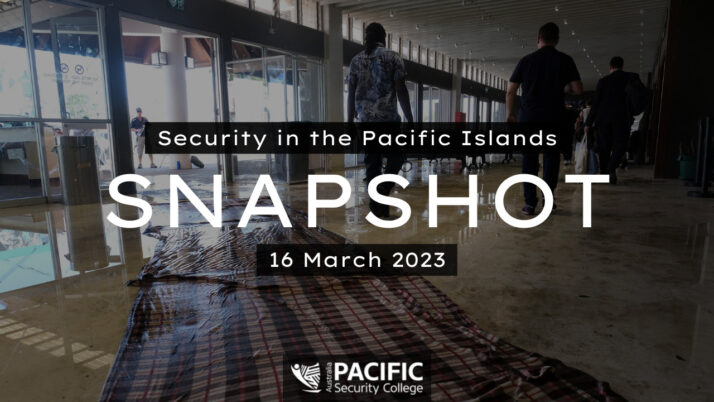
The security stories shaping the region
- ➣ Vanuatu recovers after Cyclones Judy and Kevin
- ➣ AUKUS partners announce pathway for nuclear-powered submarines in the Pacific
- ➣ Outgoing Federated States of Micronesia President Panuelo makes allegations of Chinese interference
- ➣ Special Envoy from China to the Pacific makes debut visit to the region
- ➣ High Seas Treaty signed in New York
- ➣ Pacific Elders Voice speak out against Japanese nuclear discharge
- ➣ Solomon Islands and Japan cooperate on medical equipment provision
Climate Change
Vanuatu declared a state of emergency due to the double impact of tropical Cyclones Judy and Kevin. The cost of recovery is estimated to be 6 billion vatus ($75 million AUD), with 80% of the population being affected. Vanuatu MP Gloria Julia King spoke to RNZ Pacific about the unprecedented nature of the twin cyclones but said, “I am positive Vanuatu will be able to bounce back.” However, there are concerns about food insecurity as crops in some provinces have been completely destroyed. In an interview with ABC Radio Australia, Secretary General for Tafea Province Joe Iautim said that “we are expecting people to really go out of food” within two weeks following the cyclones’ impact.
Geopolitics
Australia, the United Kingdom (UK) and the United States (US) have announced the pathway to Australia acquiring nuclear-powered submarines in the Pacific under AUKUS. The trilateral agreement has four phases. The first involves Australia embedding military and civilian personnel within the US and UK navies. The second phase will start in 2027 and will include rotations of UK and US nuclear-powered submarines in Australia. The third phase is the sale of up to five US Virginia-class submarines to Australia from the 2030s, subject to US congressional approval. The fourth and final stage is the development of the SSN-AUKUS submarine for both the UK and Australia, with Australia set to receive this capability in the early 2040s. Australian Prime Minister Anthony Albanese has revealed the deal is “the biggest single investment in Australia’s defence capability in our history” with an estimated cost of up to $368 billion AUD over three decades.
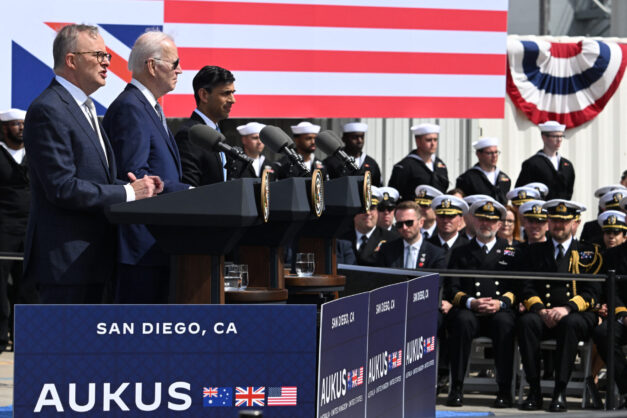
US President Joe Biden, British Prime Minister Rishi Sunak and Australian Prime Minister Anthony Albanese hold a press conference during the AUKUS summit on 13 March 2023, at Naval Base Point Loma in San Diego, California. Photo: Jim Watson / AFP
Australian Defence Minister Richard Marles has confirmed that Australia will manage all radioactive waste generated by the submarines on Australian soil, with operational low-level waste being stored at “defence sites” in Australia. Australia does not currently have the capacity to dispose of all radioactive reactor compartments when a submarine needs to be retired. However, Minister Marles has stated that “within the year, we will announce a process by which this facility will be identified.”
The People’s Republic of China (PRC) Foreign Ministry spokesperson Wang Wenbin has criticised the AUKUS partners for making the deal “for the sake of their own geopolitical interests.” Wenbin stated that the deal reflects a “typical Cold War mentality” and “will only exacerbate an arms race.” Wenbin said the AUKUS partners are undermining the international nuclear non-proliferation regime and the “concerns of the international community.” However, Chinese officials have agreed to take part in a general diplomatic corps briefing on the deal.
Responses from the Pacific are still emerging. When AUKUS was announced for the first time in September 2021, the initial Pacific response was one of concern over the contravention of regional commitments to keep the Pacific nuclear-free. At the time, Kiribati President Taneti Maamau noted his disappointment that Pacific leaders weren’t consulted and said, “we thought it would be a courtesy to raise it, to discuss it with your neighbours.” Following this week’s AUKUS summit, Prime Minister Albanese visited Fijian Prime Minister Sitiveni Rabuka in Nadi. This is the first visit between the two leaders since Rabuka’s return as Prime Minister in December 2022.
Australia is investing in our defence capability and we’re investing in our relationships.
It’s wonderful to be welcomed by Prime Minister @slrabuka here in Fiji. pic.twitter.com/mjtSMoijqh
— Anthony Albanese (@AlboMP) March 15, 2023
Separately, incumbent FSM President David Panuelo has lost his seat in congress following the country’s general election earlier in March. Prime Minister Panuelo accepted the election loss, however, the leader wrote a letter to the FSM congress and leadership alleging Chinese interference and advocating for establishing diplomatic ties with Taiwan. The letter included claims of FSM government figures being bribed by the PRC and ‘Grey Zone’ activity undertaken by China to undermine the country’s sovereignty. University of Hawai’i Associate professor Tarcisius Kabutaulaka told RNZ Pacific that the “significant” claims may be “dismissed as the views of someone who has just lost the election and therefore looking for someone to blame.”
Further, China’s Special Envoy to the Pacific, Qian Bo has made his first diplomatic tour in the region since his appointment to the position. Bo visited the Federated States of Micronesia (FSM), Papua New Guinea (PNG) and the Solomon Islands. In FSM, Bo pledged to donate 2,000 solar lights and a grant worth $140,000 USD to the FSM Department of Foreign Affairs. While in PNG, Bo visited Butuka Academy in Port Moresby, a school built under the Belt and Road Initiative. PNG Foreign Minister Justin Tkatchenko said, “we’re very proud that we’re the only school in the Pacific that teaches children how to speak Chinese” and that PNG wants to increase education partnerships with the PRC.
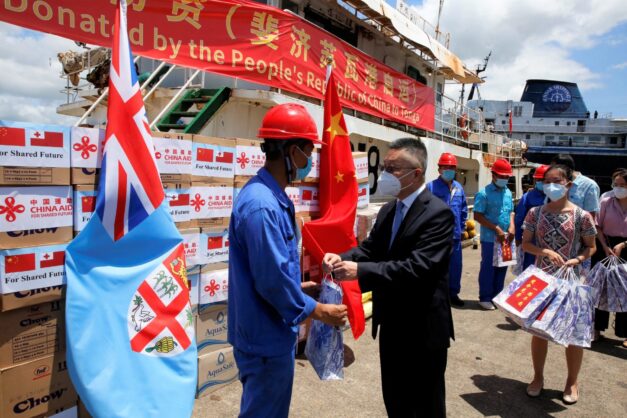
Ambassador to Fiji Qian Bo (R, front) before the shipment of the emergency aid from China to Tonga at a port in Suva’s Walu Bay, Fiji. 24 January 2022. Photo: Zhang Yongxing / AFP
Enviroment and Resources
A legally binding Biodiversity Beyond National Jurisdiction Treaty has been reached in New York. The agreement comes after nearly two decades of UN-facilitated talks concerning marine biodiversity conservation beyond national boundaries. The ‘High Seas Treaty’ provides a legal framework through which 30% of the world’s oceans will become Marine Protected Areas by 2030. To enforce the agreement, a Conference of Parties will meet periodically to hold member states accountable on issues including governance and biodiversity.
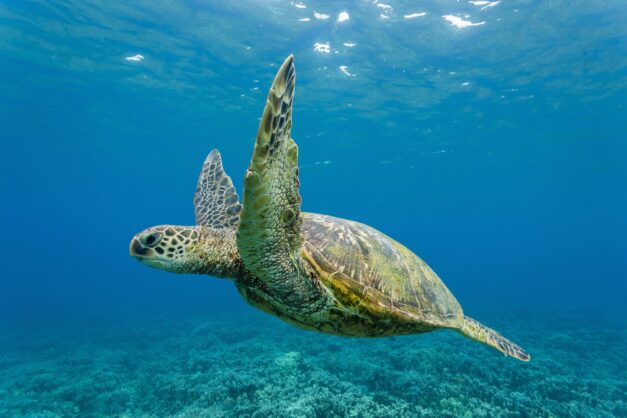
Green sea turtle swimming underwater in the Pacific Ocean. Photo: Michael Nolan / AFP
The framework includes increased funding for marine conservation and outlines how profitable marine genetic resources such as seaweed and krill will be accessed and used. In an interview with ABC Radio Australia, WWF Pacific Senior Policy and Government Affairs Manager Alfred Ralifo spoke about the significance of the treaty for Small Island Developing States. He said it has an important role in ensuring that “we are equitably benefitting from the benefits that arise from the use of biological resources that exist within the high seas.”
Pacific Islands Forum (PIF) Chair Mark Brown said that ocean states “will be further empowered” once the treaty comes into force. Brown emphasised the importance of progressing to implement the treaty, stating, “the real work has only just begun.”
In other news, the Pacific Elders Voice (PEV) have released a statement advocating against the discharge of treated nuclear waste into the Pacific Ocean. The statement condemned Japan’s plans to release treated radioactive water from the destroyed Fukushima Daiichi Nuclear Power Plant. The PEV criticised the decision being made on economic grounds as “perverse” in light of the environmental challenges already faced in the Pacific Ocean. The Elders’ statement further expressed concern that the plan would disregard the human rights of Japanese citizens and Indigenous communities in the Pacific.
🌊🛑 NO NUCLEAR FUKUSHIMA NUCLEAR DISCHARGE 🛑🌊
We note, with deep concern, Japan’s decision to release treated radioactive water from the destroyed Fukushima nuclear plant into the Pacific Ocean. https://t.co/Acaz6h7q1B
— PacificEldersVoice (@PacificElders) March 1, 2023
Health
Solomon Islands and Japan have signed an Exchange Note on the provision of medical equipment for the Solomon Islands health sector. The bilateral support is worth $12 million SBD ($2 million AUD) and includes haemoglobin meters, dry ice machines, blood cold storage units and portable ultrasound devices. Supervising Solomon Islands Minister of Foreign Affairs and External Trade Peter Agowaka said the agreement will “help bridge the existing gaps that requires urgent attention in the country’s health and medical sector.”
More Stories
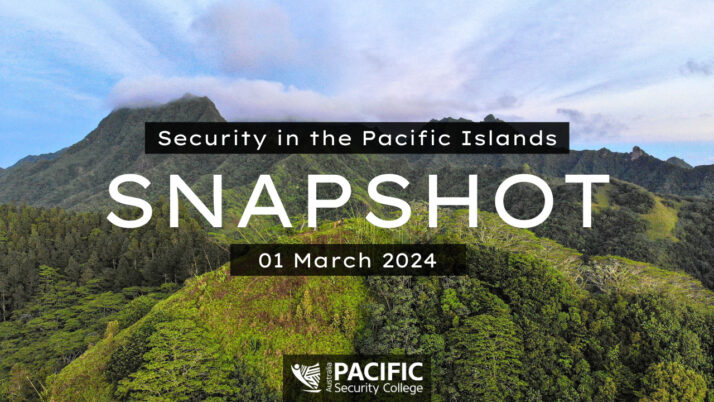
Security Snapshot - 1 Mar 2024
Pacific Security Snapshot | 01 March 2024
The security stories shaping the region ➣ Pacific Islands Leaders Meeting (PALM) to be held in Tokyo in July 2024 ➣ 2023 warmest year on record, globally ➣ Elections across the Pacific prompting changes to diplomatic relations and security arrangements ➣ Extractive industries booming ➣ Environmental conservation efforts ongoing ➣ PNG riots shed light on…
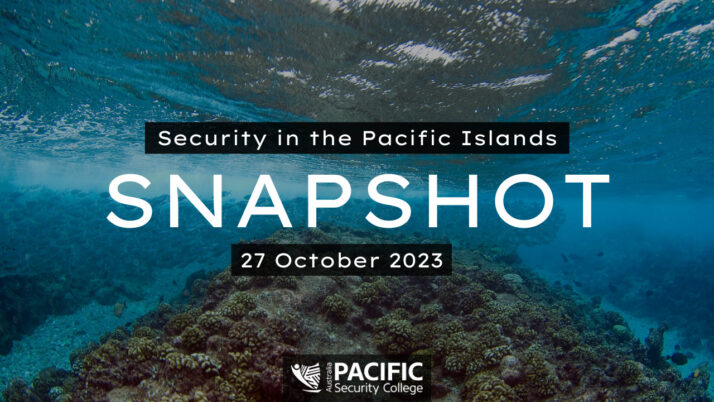
Security Snapshot - 27 Oct 2023
Pacific Security Snapshot | 27 October 2023
The security stories shaping the region Fiji Prime Minister Rabuka promotes Pacific “Zone of Peace” Fiji-Australia Memorandum of Understanding on Cyber Security Cooperation Papua New Guinea and China hold bilateral talks United States and Marshall Islands renew COFA Vanuatu, Samoa and Fiji receive Japanese human security support Pacific Islands Forum releases Loss and Damage Policy…






